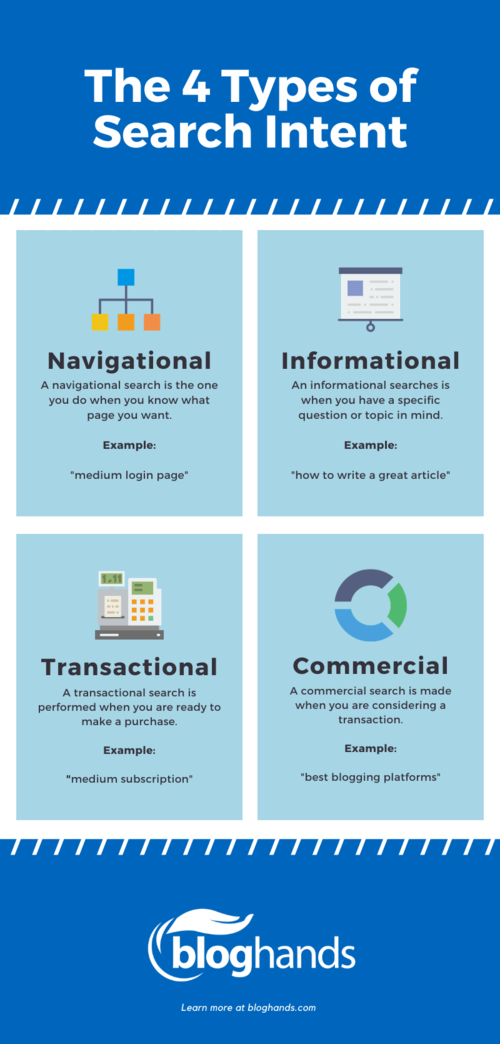Blitz News Digest
Stay updated with the latest trends and insights.
Search Intent: Decoding the Mind of Online Shoppers
Unlock the secrets of online shoppers! Discover how understanding search intent can boost your sales and online strategy.
Understanding the Different Types of Search Intent: A Guide for Online Retailers
Understanding the different types of search intent is crucial for online retailers aiming to optimize their eCommerce strategies. Search intent refers to the motivation behind a user's query and can be categorized mainly into four types: informational, navigational, transactional, and commercial investigation. For instance, users searching for 'how to care for leather shoes' are likely looking for tips and advice, which falls under informational intent. By tailoring content to meet these specific intents, retailers can enhance user experience and improve organic traffic.
On the other hand, transactional intent indicates a readiness to make a purchase, with queries like 'buy running shoes online.' Retailers should focus on optimizing product pages and ensuring a seamless checkout process for such searches. Commercial investigation queries, such as 'best running shoes for men,' reflect users in the decision-making phase, comparing options before a purchase. By understanding these nuances of search intent, online retailers can create targeted content, drive conversions, and ultimately increase sales.

How Search Intent Influences E-Commerce Success: Strategies for Targeting Customers
Understanding search intent is crucial for e-commerce businesses looking to enhance their online presence and drive sales. Search intent refers to the reason behind a user's query, whether they're seeking information, making a purchase, or comparing products. By aligning your content with the various types of search intent, such as informational, navigational, or transactional, you can better meet customer needs and improve conversion rates. For instance, when potential customers are ready to buy, they often use specific keywords that indicate their intent. Recognizing these keywords allows you to optimize product pages and create targeted marketing campaigns that appeal directly to eager shoppers.
To effectively target customers based on search intent, consider implementing the following strategies:
- Keyword Research: Start with thorough keyword research to categorize terms according to their intent. Utilize tools like Google Keyword Planner to identify which keywords convert best for your products.
- Content Creation: Develop compelling content that not only showcases your products but also addresses the questions and needs of potential buyers. For example, creating detailed buying guides or informative blog posts can help attract users with informational intent.
- User Experience: Ensure your website is optimized for user experience, making it simple for customers to navigate, find what they're looking for, and complete their purchase.
What Do Online Shoppers Really Want? Decoding Search Intent for Better Marketing
In today's digital marketplace, understanding the search intent of online shoppers is crucial for effectively catering to their needs. Consumers typically fall into one of three categories: informational, navigational, or transactional. For instance, a shopper searching for 'best running shoes' is likely in the informational stage, seeking knowledge about product options. On the other hand, someone searching for a specific brand name, such as 'Nike running shoes,' is showing navigational intent. Finally, a search phrase like 'buy Nike running shoes online' indicates transactional intent, reflecting a direct intention to make a purchase. Recognizing these nuances helps marketers tailor their content strategies.
To truly resonate with online shoppers, brands must leverage targeted marketing strategies that align with their search intent. Incorporating relevant keywords, creating engaging product descriptions, and utilizing schema markup can significantly enhance visibility on search engines. Additionally, optimizing for voice search is becoming increasingly important as more consumers rely on smart devices for quick queries. According to recent trends, showcasing customer reviews and emphasizing unique selling points can also sway potential buyers. Thus, by decoding search intent and adjusting marketing approaches accordingly, businesses can create a more personalized shopping experience that drives conversions.